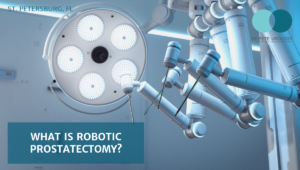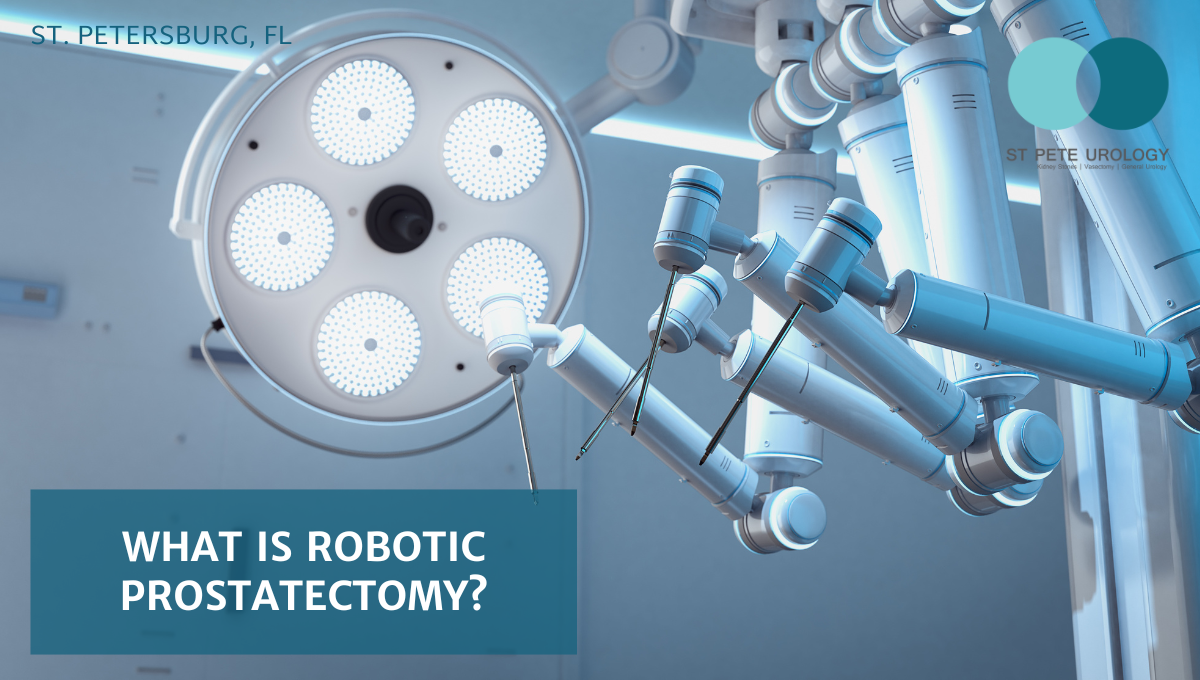Key Takeaways:
- The da Vinci Robotic Radical Prostatectomy is an innovative surgical technique used to remove the prostate in patients diagnosed with prostate cancer.
- The da Vinci robot provides for less blood loss, smaller incisions, a shorter hospital stay, and quicker recovery than the open approach.
- St Pete Urology in St. Petersburg, FL is leveraging advancements in technology for the benefit of their patients with a commitment to personalized care.


“Hi, I’m Dr. Nicholas Laryngakis, board certified urologist with St Pete Urology. Some patients are diagnosed with prostate cancer and elect to have surgical removal of their prostate for their best chance of cure,” explains Dr. Laryngakis in an introduction that can put even the most anxious patient at ease.
The Dawn of a New Era in Prostatectomy
Let’s first understand what exactly, at its most fundamental level, robotic prostatectomy is. At the forefront of this innovative surgical technique is the da Vinci Robotic Radical Prostatectomy. This procedure is employed to remove the prostate in patients diagnosed with prostate cancer. Furthermore, the notion of a robot performing surgery may sound like something out of a science fiction novel. However, it is a reality in today’s medical world.
According to Dr. Laryngakis, “The da Vinci robot is the newest technology used to remove the prostate. It provides for less blood loss, smaller incisions, a shorter hospital stay, and quicker recovery. Additionally, this allows patients to return home and resume normal activities sooner than the traditional open approach.” With these benefits, it’s easy to see why this technology has become the preferred method for many urologists in St. Petersburg, FL, and beyond.
Tailoring the Treatment to the Patient
Admittedly, while the da Vinci Robotic Radical Prostatectomy has its advantages, it is not the only solution for prostate cancer treatment. There are traditional open approaches. And, a patient’s individual circumstances will ultimately dictate which method is chosen.
“Both approaches can be done depending on the patient’s situation, but most robotic prostatectomies are the way to treat prostate cancer,” Dr. Laryngakis clarifies. The ability to provide both types of treatment highlights the versatility of modern urology and reinforces the importance of personalized healthcare.
A Beacon of Hope in St. Petersburg, FL
Nestled in St. Petersburg, FL, at the heart of the dynamic Tampa Bay area, you’ll find a urology practice that’s making waves in the fight against prostate cancer. At St. Pete Urology, a team of dedicated professionals, led by board-certified urologists like Dr. Laryngakis. They stand at the forefront of advancing prostate cancer treatment through da Vinci Robotic Radical Prostatectomy.
St. Pete Urology doesn’t just focus on providing top-notch healthcare. Also, they understand that the battle against prostate cancer is both a physical and emotional fight. With a commitment to patient-centric care and a skilled, compassionate team, they offer access to state-of-the-art technologies, including the da Vinci robot. As a result, this makes their practice a beacon of hope for many individuals battling prostate cancer.
In an era where advancements in technology are impacting all areas of life, healthcare stands out as one of the most profoundly touched sectors. As you navigate this landscape, having trustworthy medical professionals on your side is essential. Dr. Laryngakis and his team are demonstrating that when it comes to the fight against prostate cancer. Furthermore, a robotic prostatectomy is a powerful tool in the hands of a skilled urologist. The future of prostate cancer treatment shines brightly in places like St. Petersburg, FL. Here, medical practices like St Pete Urology are leveraging these advancements for the benefit of their patients.
References:
- St Pete Urology. (2011, November 2). Prostate Cancer. St Pete Urology. https://stpeteurology.com/prostate-cancer/
- St. Pete Urology | Urologists in St Petersburg, Florida. (2020, September 14). St Pete Urology. https://stpeteurology.com/da-vinci-laparoscopic-radical-prostatectomy/
- Radical prostatectomy: MedlinePlus Medical Encyclopedia. (2020). Medlineplus.gov. https://medlineplus.gov/ency/article/007300.htm
- Health. (2022). Prostatectomy – for cancer. Vic.gov.au. https://www.betterhealth.vic.gov.au/health/conditionsandtreatments/prostatectomy-for-cancer
- Robotic Surgery for Cancer: The Da Vinci Surgical System. (2022, April). City of Hope. https://www.cancercenter.com/treatment-options/surgery/surgical-oncology/robotic-surgery


